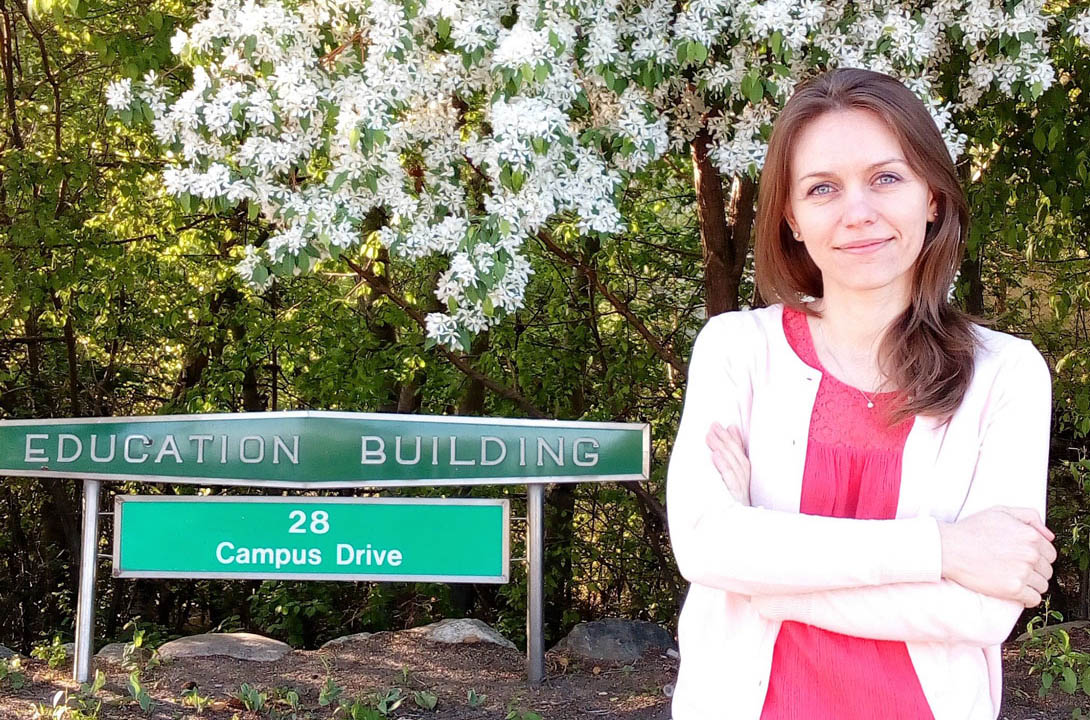
USask PhD graduate earns national recognition for her research focused on leadership in Ukrainian higher education
Dr. Nataliia Zakharchuk (PhD), a graduate of the Department of Educational Administration in the College of Education, has received both a national dissertation award and a University of Saskatchewan (USask) award for her thesis exploring the transformation of university governance in Ukraine.
By Meagan HintherZakharchuk is the recipient of the Tomas B. Greenfield Award from the Canadian Association for the Study of Educational Administration (CASEA). The award recognizes the best Doctoral Dissertation in the area of educational administration and leadership completed at a Canadian university in 2021. In addition, she received a USask Graduate Thesis Award (Doctoral) in the Social Sciences B category for the 2021-22 academic year.
“My research focused on the transformation of governance and administration in Ukrainian universities under multiple and sometimes contradictory influences,” said Zakharchuk. “Historically, seven decades of Soviet totalitarianism affected higher education in Ukraine more than in other 14-member countries.”
She explained how during the Soviet era, Ukraine survived collectivization, three famines (including the Holomodor genocide of 1932-33), mass repression, mass resettlement of Ukrainian people and fierce eradication of Ukrainian national self-consciousness. The country continues to experience Russia’s destabilizing political and economic pressures, most notably with Russia’s recent escalation of war as it attempts to occupy the whole of Ukraine through military force.
“The Soviet totalitarian regime manifested in hyper-centralized control over the education system, with universities resembling factory-like organizations,” said Zakharchuk. “The administrative hierarchy was reinforced by extreme bureaucracy, hyper-control over faculty and students, regulated access to buildings, controlled classes and surveillance of teachers outside universities.”
In 2005, Ukraine committed to the Bologna Process which aimed to ensure comparability in the standards and quality of higher-education qualifications. The process brought profound reforms, including reforms in higher education governance. In her dissertation, Zakharchuk investigated the interrelated political, economic and social contexts and their influence on education governance.
“I selected three Ukrainian public universities as research sites due to their legal status, similar historical background and recent governance changes,” said Zakharchuk. “In 2017, for the first time in the history of the three universities, their labour collective elected university rectors without the direct involvement of the Ukrainian Ministry of Education and Science.”
Zakharchuk spent the summer of 2019 in her native Ukraine conducting interviews with eleven university presidents, provosts and other senior administrators. Data analysis helped her identify that the higher education governance in Ukraine is transforming in two directions: toward decentralizing higher education inherited from the Soviet times and responding to European education policies.
“My findings showed that on the one hand, Europeanization had become a change-promoting force and accelerated higher education governance reforms. On the other hand, inherited Soviet structures persisted as professional values and invoked conformity to the past and resistance to the Bologna changes,” she said.
Her supervisor, Dr. Jing Xiao (PhD), associate professor in the Department of Educational Administration, spoke enthusiastically of the recognition and Zakharchuk’s research.
“With the ongoing Russian military invasion of Ukraine and its implications for the world, Dr. Zakharchuk’s dissertation is particularly timely as an original interdisciplinary study on Ukraine,” said Xiao. “Her dissertation vividly depicts the voices and perspectives of Ukrainian university senior administrators, which are rarely represented in the existing educational literature. Her findings will have a significant impact on the development of policies and practices in university governance and leadership [in post-Soviet countries].”
“I am immensely grateful and humbled by this award and such recognition,” said Zakharchuk.
When speaking about the effects that the current conflict will have on post-secondary education, Zakharchuk spoke about how the two recent revolutions in Ukraine (the Orange Revolution on the cusp of 2005 and the Revolution of Dignity in 2014) set a distinct direction toward democratic processes in Ukrainian society and education governance.
“The war has destroyed numerous Ukrainian universities and interfered with the usual education process. However, there are many reasons to believe that the war will reinforce national self-determination similar to the one already initiated by the [previous revolutions],” said Zakharchuk. “The war might also strengthen Ukraine’s commitment to the Bologna Process and erase all remnants of the Soviet oppressive practices.”

